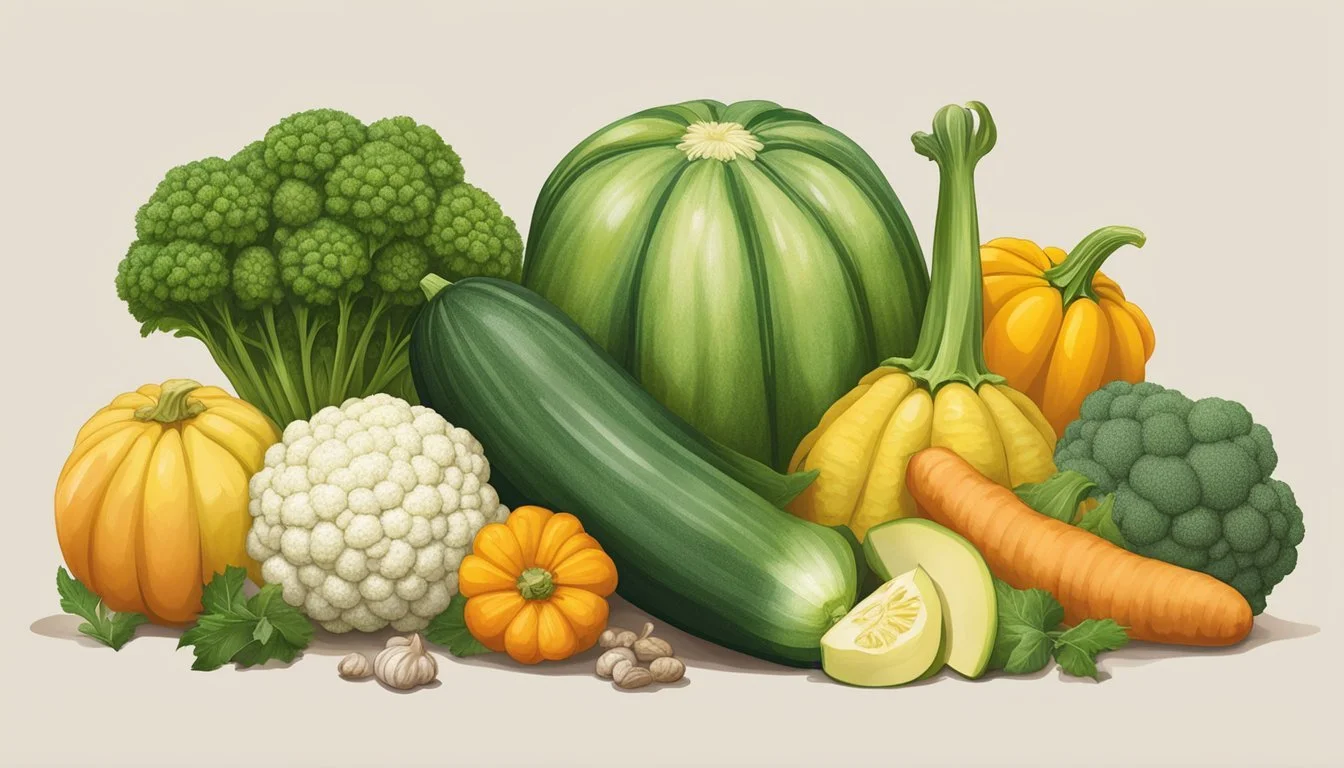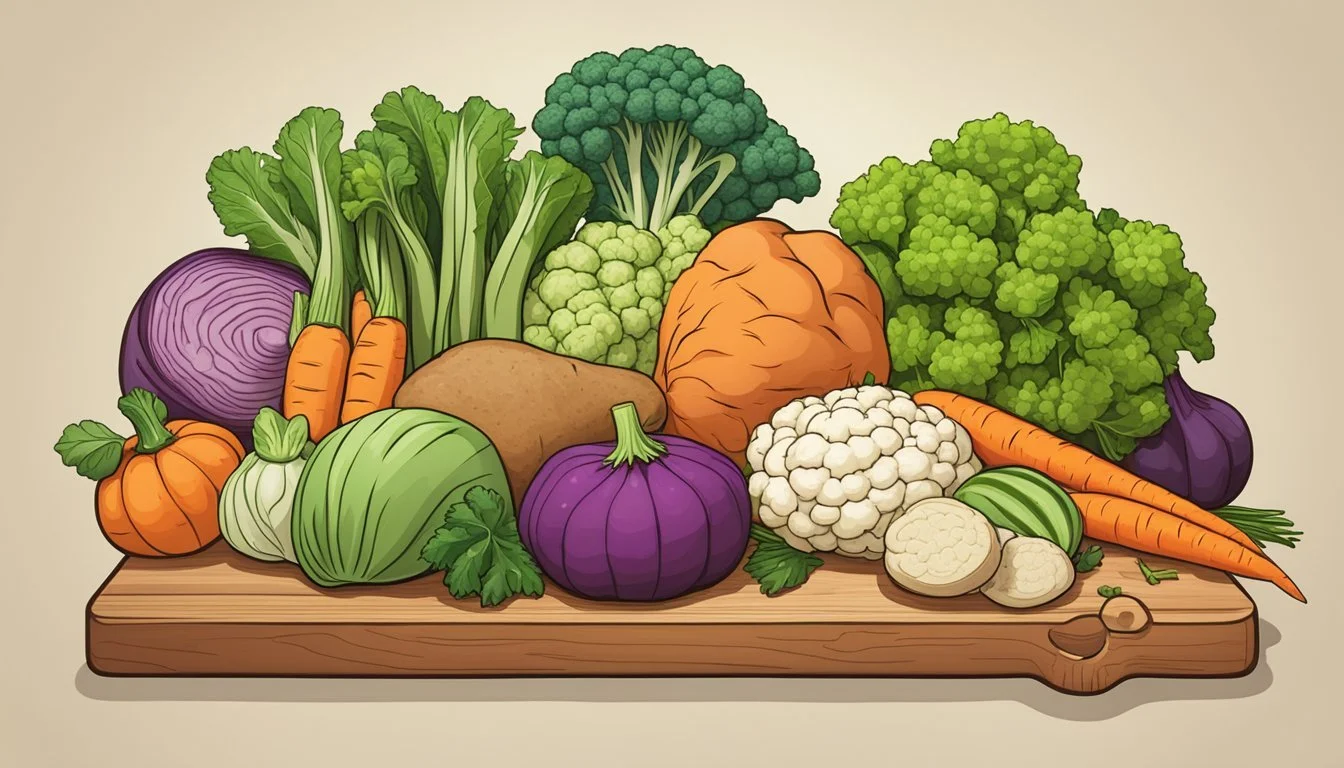Kumara Substitutes
Top Alternatives for Your Recipes
Exploring the world of kumara substitutes opens up a variety of delicious and nutritious options for culinary enthusiasts. Kumara, known for its slightly denser texture and diverse skin and flesh colors, can be effectively substituted with sweet potatoes in most recipes. Sweet potatoes offer a similar level of sweetness and versatility, making them a suitable alternative in dishes like chips, pies, or even salads.
When replacing kumara with other vegetables, yucca might come to mind. While yucca can be used as a substitute, it requires careful preparation to achieve the desired texture and taste. Experimenting with these substitutes not only provides a practical solution when kumara is unavailable but also introduces new flavors and textures to familiar recipes.
For those looking to diversify their recipe repertoire, exploring kumara alternatives can be an exciting culinary adventure. From savory bakes to delectable cakes, the slight variations between kumara and its substitutes can add a unique twist to traditional dishes, ensuring every meal is both innovative and satisfying.
Understanding Kumara
Kumara, also known as sweet potato, is a versatile and nutritious root vegetable with a variety of types and characteristics. This section will discuss its nutritional benefits and explore the different varieties available, highlighting their unique traits.
Nutritional Profile
Kumara is rich in essential nutrients. It provides an excellent source of dietary fiber, vitamins, and minerals. Notably, it is high in vitamin A, particularly in the form of beta-carotene, which is beneficial for vision and immune function. Additionally, it contains significant amounts of vitamin C, which is vital for tissue repair and the immune system.
Further, kumara is a good source of potassium, which supports heart health and regulates fluid balance. Its complex carbohydrates offer sustained energy release, making it ideal for balanced diets. Despite its sweet flavor, kumara has a low glycemic index, which helps in managing blood sugar levels effectively.
Varieties and Characteristics
There are numerous varieties of kumara, each with distinct features. Some of the most well-known include Beauregard, Hernandez, and Okinawan.
Beauregard has an orange flesh and smooth skin. It's sweet and moist, making it popular for baking. Hernandez is similar but often sweeter and darker in skin. Okinawan kumara has a stunning purple flesh, known for its high antioxidant content.
Each variety has unique cultivation requirements. For instance, Beauregard thrives in well-drained, sandy soils, while Okinawan prefers climates with long, hot growing seasons. Understanding these characteristics helps in selecting the right type for specific culinary and agricultural needs.
Popular Kumara Dishes
Kumara, also known as sweet potato, is a versatile ingredient that can be incorporated into numerous dishes. From baked treats to creamy mashes and refreshing salads, kumara is celebrated in many forms.
Baked Kumara
Baked kumara is a delightful side dish that pairs well with various main courses. Kumara Chips, for example, are a popular snack, easy to prepare by slicing kumara into wedges, seasoning with spices, and baking until crispy.
Another favorite is Kumara Bake, where kumara slices are arranged in a baking dish with herbs like rosemary, drizzled with butter or oil, and baked until tender. This method brings out the natural sweetness and enhances the kumara's flavor. Baked kumara can also be stuffed with fillings such as quinoa, beans, or cheese for a more filling meal.
Kumara Mash
Kumara Mash provides a smooth, creamy texture that complements many dishes. It’s made by boiling kumara until tender, then mashing it with ingredients like butter, cream, or even grated ginger.
A popular variation is the Kumara and Ginger Mash, where the addition of ginger creates a zesty twist. When making kumara mash, it's essential to achieve the right consistency, ensuring it's neither too lumpy nor too smooth. This dish often accompanies roasts or grilled meats but can also serve as a comforting standalone side dish.
Kumara Salads
Kumara Salads offer a refreshing, nutritious option that can serve as a main course or side dish. These salads often include roasted or boiled kumara chunks mixed with a variety of vegetables, grains, and dressings.
Popular recipes include Kumara and Chickpea Salad, where the kumara is combined with chickpeas, spinach, and a tangy vinaigrette. Another favorite is the Roasted Kumara Salad, featuring kumara roasted with olive oil and herbs, then tossed with greens and nuts. These salads highlight the kumara's versatility and ability to blend well with both savory and sweet components.
Each of these kumara dishes showcases the ingredient's unique flavors and textures, making it a beloved choice in many kitchens.
Vegetable Substitutes
When looking for a substitute for kumara (also known as sweet potato), several vegetables can serve as excellent alternatives. Two primary categories worth considering are root vegetables and squashes.
Root Vegetables as Substitutes
Root vegetables like carrots and potatoes can effectively replace kumara in various recipes. Carrots offer a slightly sweet flavor and a firm texture, making them ideal for stews and roasts. Potatoes, on the other hand, provide a neutral taste and are versatile in different cooking methods such as boiling, baking, and frying.
Both carrots and potatoes can be used in a mash, with carrots lending a slightly sweet note and potatoes offering a creamier consistency. They can be chopped into small cubes and roasted to achieve a similar texture and taste profile to kumara.
Squashes as Alternatives
Squashes such as zucchini and acorn squash are also great substitutes. Zucchini is known for its mild flavor and tender flesh, which works well in stir-fries and casseroles. It doesn’t mimic the sweetness of kumara but adds a similar bulk to dishes.
Acorn squash is another excellent alternative due to its sweet, nutty flavor and firm texture. It can be roasted, baked, or pureed, providing a taste and consistency close to kumara. Acorn squash is particularly suitable for soups and stews, where it can absorb flavors from the cooking liquid while adding its own sweetness.
By choosing the right vegetable substitute, one can replicate the texture and flavor that kumara brings to a dish.
Cooking Alternatives
When exploring substitutes for kumara (sweet potatoes), the reader must consider different cooking methods and seasoning adjustments. Below are key details for effective preparation.
Methods of Preparation
To bake, preheat the oven to 400°F. Substitute kumara with butternut squash or carrots. These offer a similar texture and sweetness. Peel, cut into cubes, and toss with olive oil, salt, and pepper. Spread on a baking sheet and roast for about 25-30 minutes until tender.
For steaming, use a pot and lid. Pumpkin or yams make excellent substitutes. Cut into chunks and steam for 15-20 minutes. Steaming helps retain moisture and natural sweetness.
In mashing, potatoes or parsnips work well. Boil in salted water until soft, then mash with butter, salt, and pepper. These methods ensure flavors and textures comparable to kumara.
Seasoning Adjustments
Adjust seasonings when substituting kumara to maintain balanced flavors. Carrots and butternut squash may need additional butter and brown sugar to enhance their sweetness. Use herbs like rosemary or thyme for depth.
For parsnips or potatoes, consider adding garlic and nutmeg. This enhances their more subtle flavors, bringing out a richness akin to kumara.
Maintain classic pairings like salt and pepper but play with smoked paprika or cumin for a twist. These options help achieve a satisfying taste profile similar to what kumara provides in dishes.
Non-Vegetable Substitutes
When looking for kumara substitutes, non-vegetable options that add creaminess, richness, or lightness to your dishes can be excellent choices. These alternatives include various cheeses, animal products, and leafy greens.
Cheeses for Creaminess
Cheese adds a delectable creamy texture that can easily substitute the starchy sweetness of kumara. Ricotta and cream cheese are particularly effective in creating smooth, velvety textures, especially in mashed or baked dishes.
Mascarpone is another cheese that offers a rich, buttery flavor. Cheddar can also be a good substitute, providing a mildly sharp taste and a creamy finish when melted.*
Utilizing these cheeses, one can maintain the desired creaminess without relying on kumara.
Animal Products for Richness
Animal products like bacon and lard can provide a rich, savory depth to dishes that require the hearty properties of kumara. Bacon, with its salty and smoky profile, enhances soups, stews, and casseroles significantly.
Lard can be used for frying or baking, adding a pleasant fattiness and richness. Pork belly is another excellent choice, offering a combination of fat and meat, creating a tender and juicy substitute for kumara in roasts or slow-cooked meals.
Leafy Greens for Lightness
Spinach leaves are ideal for those looking to replace kumara with a lighter, fresher option. They can be sautéed, steamed, or used raw in salads. Swiss chard and kale are also valuable alternatives.
These leafy greens can be blended into soups or incorporated into stir-fries, offering a lighter, more delicate texture. Avocado is another versatile substitute, providing a creamy texture and high healthy fat content, perfect for salads or as a spread.
These non-vegetable substitutes ensure that your dishes remain flavorful, varied, and satisfying, even when kumara is not on the menu.
Flavoring with Spices and Herbs
To enhance the unique sweetness and earthiness of kumara, the right herbs and spices can make a significant difference. Specific combinations can elevate the flavor profile, adding both complexity and depth.
Herbs to Complement Kumara
Herbs like rosemary, thyme, and sage blend exceptionally well with kumara. Rosemary's pine-like aroma offers a robust flavor that contrasts beautifully with the sweetness of kumara.
Thyme provides a milder, yet aromatic flavor that doesn't overpower the dish. It's especially good when used in roasted or mashed kumara recipes.
Sage, known for its pungent and slightly peppery taste, can be used sparingly to bring out the natural sweetness of kumara. Fresh herbs add a vibrant note, while dried versions offer a more concentrated flavor.
Spices for Enhanced Flavor
Spices play a crucial role in accentuating the taste of kumara. Coriander, cumin, and garam masala are particularly effective.
Coriander seeds or ground coriander add a citrusy undertone that complements the earthy flavor of kumara.
Cumin brings a warm, nutty flavor that enhances the comfort-food quality of kumara dishes.
Garam masala, a blend of various spices like cumin, coriander, and cardamom, offers a complex, rich taste that elevates the overall flavor.
Additionally, a pinch of salt and pepper can balance sweetness and earthiness, bringing a well-rounded flavor profile to kumara preparations. Use these spices and herbs thoughtfully to transform kumara into a flavorful culinary experience.
Incorporating Kumara Substitutes in Diet
Salads Substituting kumara in salads is easy and offers nutritional benefits. Sweet potatoes, carrots, or butternut squash are great alternatives. Roast these vegetables to bring out their natural sweetness and add them to mixed greens, quinoa, or grain salads for variety in texture and flavor.
Side Dish Kumara substitutes can shine as side dishes. Try sweet potatoes, which have a similar taste and texture, or experiment with parsnips and turnips. Bake or mash them for a delicious accompaniment to meats or vegetarian dishes.
Recipes Incorporate kumara substitutes into your favorite recipes. Replace kumara with sweet potatoes in casseroles, soups, or stews. Use butternut squash in place of kumara in curries or stir-fries. This not only adds variety but also ensures you benefit from a range of nutrients.
Substitutes Best For Sweet potatoes Salads, Side Dishes Carrots Salads, Side Dishes Butternut squash Recipes, Side Dishes Parsnips Side Dishes, Recipes Turnips Side Dishes, Recipes
Using a range of substitutes can keep meals interesting and nutritious. Adjust cooking times and methods to suit each vegetable and enhance their flavors.









